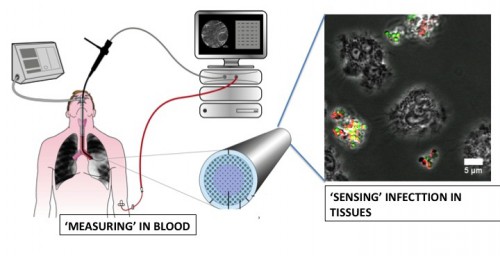A PROBE just a few millimetres wide is being developed by Scottish scientists in a bid to save the lives of seriously ill patients.
The device will be small enough to be passed inside lungs, blood vessels, brains – and even the premature babies.
The sensor, which is being developed by Edinburgh University, will provide an alternative to the use of X-rays.
Scientists will even be able to watch the effects of drugs on the human body in real time.
The probe will work by sending light down a bundle of thousands of fibreoptic cables, each of which has a tiny sensor at the end.
The device is so small – and sensitive – it will be able to detect changes in the body at the molecular level, telling medics if disease or infections are present.
The £11.2m programme, which hopes to have prototype ready in 18 months, will mainly be used to examine the lungs of patients in intensive care.
Medics hope it will help them spot lung infections before they pose a fatal risk.
Critically ill premature babies could also be helped by using the probe to measure oxygen, acid and glucose levels without the need for more invasive testing.
Chemistry professor Mark Bradley said: “When a patient is in intensive care and there’s something wrong with their lungs all doctors have at the minute is an X-ray.
“But that doesn’t necessarily show if it’s bacteria, fluid or a blood infection.”
He continued: “Our Fibre-based Optical Sensing and Imaging Platform (FOSIP) will give doctors the ability to rapidly diagnosis patients and inform them about the best drugs for patients.
“It will monitor a patient’s condition in real time – without the need for cumbersome equipment or ionizing radiation. ”
He said the probe would not just be limited to lungs.
“Anywhere you can put a probe it can go. It can go in any orifice.
“If surgeons have opened up the brain already it can go there.”
Technology
Prof Bradley said this was the “next step ahead” from fiberoptic technology used in colonoscopies, which allow doctors to see inside patients.
The probe would enter patients’ lungs through the nose, using channels already used for bronchoscopies.
The probe can detect 20 different indicators of disease, and it is hoped it could detect gastrointestinal and reproductive tract problems.
He and his team are thought to be the only scientists in the world working on the technology.
The project involves physicists, chemists, engineers, computer experts and clinicians from Universities Edinburgh and Bath and Heriot-Watt University.
It is one of three UK projects to receive funding to develop healthcare technologies from the Engineering and Physical Sciences Research Council (EPSRC).


